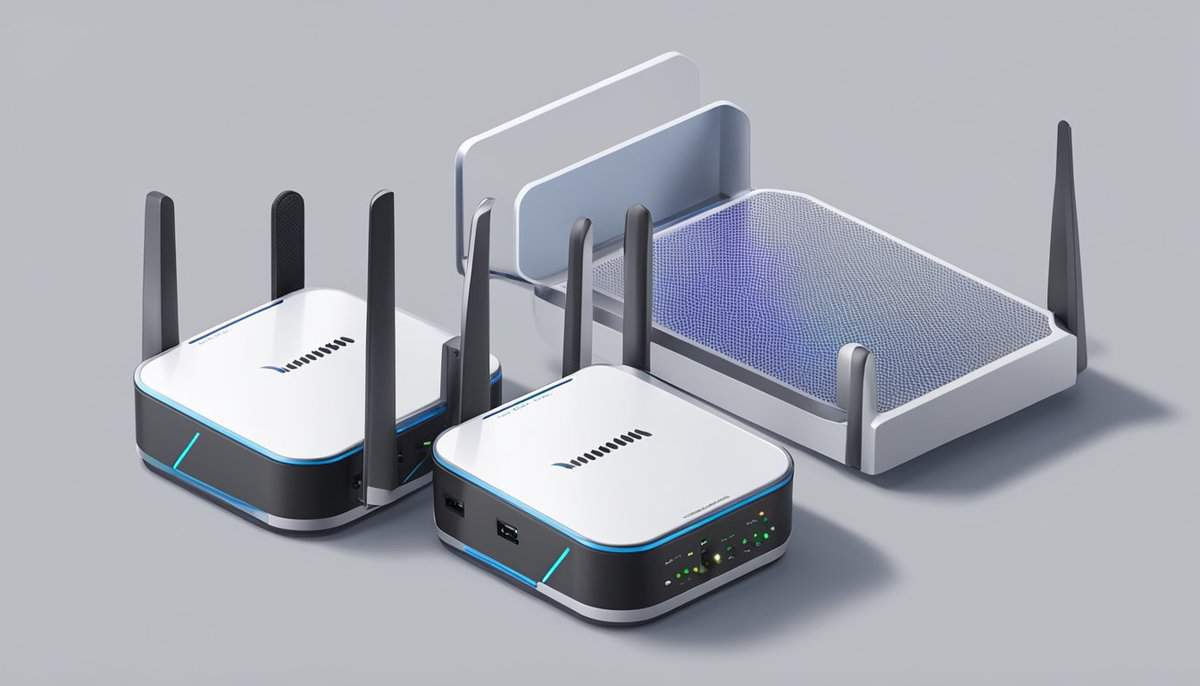Struggling with patchy Wi-Fi coverage in your home? You’re not alone. Enhancing your wireless network can be done through either Wi-Fi extenders or mesh networks.
Wi-Fi extenders amplify your current signal, while mesh networks provide a more robust and seamless connection throughout your home.
Choosing between the two can be tricky. Wi-Fi extenders are often cheaper and easier to set up, but they may not always offer consistent performance. In contrast, mesh networks create a unified system with multiple nodes, ensuring you get reliable coverage even in large spaces.
Understanding your needs will help you make the right choice. If you have a small area with minor dead zones, a Wi-Fi extender might be enough. For larger homes or places with many obstacles, a mesh network could be the solution to your connectivity woes.
Key Takeaways
- Wi-Fi extenders are cost-effective but may have variable performance.
- Mesh networks provide consistent coverage, especially in larger homes.
- Choose the right solution based on your home size and Wi-Fi needs.
Understanding the Basics
Choosing between a Wi-Fi extender and a mesh network can impact your internet experience significantly. They both aim to boost your signal, but they work in different ways and have unique benefits.
What Are Wi-Fi Extenders?
Wi-Fi extenders, also known as repeaters, help expand your router’s coverage area. By capturing the existing Wi-Fi signal from your router, they amplify it and broadcast it again. This helps cover those annoying dead spots in your home where the signal is weak.
Wi-Fi extenders have their own SSID, or network name. You’ll need to switch between networks when moving around your home. They are usually cheaper and easier to set up than mesh networks but can sometimes result in slower speeds, especially if the extender is placed far from the router.
Wi-Fi extenders work best in smaller homes or areas where you just have a couple of dead zones. For optimal performance, place the extender halfway between your router and the area where the signal is weak.
What Are Mesh Networks?
Mesh networks consist of several connected nodes that create a single, seamless Wi-Fi network across your home. Unlike extenders, mesh systems use smart routing techniques to ensure that your devices connect to the node with the strongest signal.
Each node in a mesh network communicates with the other nodes, ensuring full coverage. You don’t have to switch SSIDs as you move around because the system automatically connects you to the best node. This means you get stable and strong internet coverage everywhere in your house.
Mesh networks are perfect for larger homes or spaces with multiple floors. They can be a bit more expensive and might require a more complex setup compared to Wi-Fi extenders. However, they offer superior performance and consistency, making them worth the investment for many users.
Key Differences Between Wi-Fi Extenders and Mesh Networks
Wi-Fi extenders and mesh networks both aim to improve your Wi-Fi but they do so in different ways. Each has its own strengths and weaknesses regarding signal strength, coverage, network performance, and ease of setup.
Signal Strength and Coverage
Wi-Fi extenders primarily work by repeating the signal from your main router. This can help cover dead zones but might not always provide strong signal strength throughout your home. The further away the extender is from the main router, the weaker the signal gets.
In contrast, mesh networks use multiple nodes, or access points, distributed around your home. These nodes create a seamless network with strong signal strength and wider coverage. Each node communicates with the others, ensuring consistent Wi-Fi coverage even in larger homes.
Network Performance and Speeds
Performance is another key difference. Wi-Fi extenders can often slow down your internet speed because they repeat the signal. When you connect to an extender, the data has to hop twice – from the router to the extender, then to your device. This can introduce delays and reduce speeds.
Mesh networks, like those from Netgear, don’t have this problem. They create a single, strong network that doesn’t need to repeat the signal. All nodes contribute to a unified network, which means you’ll generally experience faster and more reliable speeds.
Ease of Setup and Management
Setting up a Wi-Fi extender is usually straightforward. You plug it in, connect it to your network, and you’re good to go. It’s a quick fix for small coverage problems but might need manual management if you add multiple extenders.
Mesh networks require a bit more effort initially. You’ll need to place and configure several nodes around your home. This can be more demanding, requiring time and care to ensure each node is optimally positioned. However, once set up, mesh networks typically offer easier management through centralized apps.
Choosing between a Wi-Fi extender and a mesh network depends on your specific needs. If you’re looking for a quick solution for a small area, an extender might be enough. For larger spaces with multiple devices, a mesh network offers stronger, consistent coverage and performance. For example, Mesh networks are ideal for homes with many rooms and large distances between devices.
Pros and Cons

Choosing between a WiFi extender and a mesh network boils down to what’s best for your needs, budget, and home layout. Both options have advantages and trade-offs, making it important to weigh them carefully.
Advantages of Mesh Networks
Mesh networks are great for large homes with many rooms. They use multiple devices to blanket your home in strong Wi-Fi, reducing dead zones. Mesh routers like Eero and Google Nest WiFi ensure seamless coverage, transitioning smoothly as you move through your home.
Mesh systems often come equipped with Wi-Fi 6, providing faster speeds and better performance, especially in homes with many connected devices. This is ideal for streaming, gaming, and smart home setups.
Easy management is another plus. Most mesh systems come with user-friendly apps that let you monitor and control your network. You can set up parental controls, guest networks, and even see which devices are connected.
Benefits of Wi-Fi Extenders
Wi-Fi extenders, also known as range extenders, are a more affordable option for extending your Wi-Fi coverage. They work by repeating your existing Wi-Fi signal, boosting it to reach areas with weak or no signal. This makes them a good choice for smaller budgets.
Setup for extenders is generally straightforward. You plug them in, connect them to your existing network, and they’re good to go. Some models even come with a setup wizard to guide you through the process.
Extenders are flexible, allowing you to move them around to optimize your coverage. If one area of your home starts getting weak signal again, you can easily relocate the extender to solve the problem.
Limitations and Trade-Offs
Despite their benefits, mesh networks have some downsides. Their initial cost is generally higher than that of extenders, which can be a barrier if you’re on a tight budget. Plus, setting up a mesh network can be more complex, as you’ll need to place multiple devices throughout your home.
Wi-Fi extenders come with their own set of limitations. They often provide lower speeds than mesh systems, especially as you move further from the main router. This can affect performance for activities like streaming or online gaming.
Signal degradation is another issue with extenders. As the signal is repeated, it weakens, meaning that the further away the extender is from the main router, the weaker your internet speed might be.
By considering these pros and cons, you can make an informed decision that best fits your needs.
Selecting the Right Solution for Your Home

Choosing between a WiFi extender and a mesh network depends on several factors like the size of your home, the internet speeds provided by your ISP, and your budget. Let’s break down these considerations to help you make an informed choice.
Considering House Size and Layout
For smaller homes or apartments, a WiFi extender can be a simple, cost-effective solution. Extenders are ideal for eliminating dead spots in a few rooms. If your layout includes many walls or levels, a mesh network may provide better coverage.
Mesh network systems are particularly effective in larger homes. They use multiple nodes to project a strong, consistent WiFi signal in every corner. This can be especially useful in homes with multiple floors or sprawling layouts.
Pros of Mesh Networks:
- Coverage for larger areas
- Strong signal strength
Pros of WiFi Extenders:
- Budget-friendly
- Easy installation
Internet Speeds and Your ISP
If you’ve got a high-speed internet package from your ISP, a mesh network will help you make the most of it. Mesh networks handle high speeds better and distribute them evenly across your home. This means streaming 4K videos or gaming online without lag becomes more achievable.
WiFi extenders might not maintain the same speed as your primary wireless router. The further you place an extender from the router, the weaker the signal can get. This can affect your internet speed, especially if you’re using multiple devices simultaneously.
Mesh Network Benefits:
- Better speed distribution
- Ideal for high-speed packages
WiFi Extender Drawbacks:
- Potential speed degradation
- Limited by router’s original signal strength
Budget and Cost-Effectiveness
Budget plays a crucial role in your choice. WiFi extenders are generally more budget-friendly and can be a quick fix for small areas with weak signals. They cost less upfront and might be all you need for smaller spaces.
Mesh networks, on the other hand, come with a higher price tag but bring more robust, versatile coverage. If investing in a high-quality internet experience across a large home is important to you, it might be worth the extra cost.
WiFi Extender Benefits:
- Lower cost
- Basic coverage enhancement
Mesh Network Costs:
- More expensive
- Comprehensive, whole-home coverage
By considering these factors, you’ll be better equipped to select the right WiFi solution for your home.
Tech Specs and Considerations

When deciding between WiFi extenders and mesh networks, it’s crucial to understand tech specs like frequency bands, compatibility, and security. These factors help determine which system best meets your needs.
Frequency Bands and Tri-Band Technology
WiFi systems operate on different frequency bands: 2.4 GHz, 5 GHz, and newer 6 GHz with Wi-Fi 6E. Standard systems use dual-band, covering 2.4 GHz and 5 GHz. Tri-band technology adds an extra 5 GHz or 6 GHz band. This can significantly reduce congestion, especially in busy networks.
Mesh networks often use tri-band to improve data routing. This means faster speeds and less interference, which is vital if many devices are connected. Consider your home’s size and device usage when choosing between dual-band or tri-band systems.
Compatibility and Future-Proofing
Compatibility is key for both extenders and mesh networks. Many people prefer systems that support the latest Wi-Fi standards, like Wi-Fi 6 or 6E. These offer more speed and efficiency. Make sure your devices support these newer standards for a seamless experience.
Future-proofing is also about device compatibility. Mesh networks often work with various devices, while some extenders may have limits. Think about long-term needs, especially if you plan to add more smart home devices or upgrade your internet service. Considering this can save you time and money later.
Security and Smart Home Integration
Security is a crucial consideration in any network setup. Most modern systems support standard security protocols like WPA3, offering secure connections. Check if the mesh or extender offers regular firmware updates to maintain security.
Smart home integration is another aspect worth examining. Some mesh systems double as smart home hubs, supporting protocols like Zigbee and easing the control of smart devices. This integration can simplify setups, especially if your ecosystem is already diverse with different devices. It’s a handy feature if enhancing your smart home is a priority.

